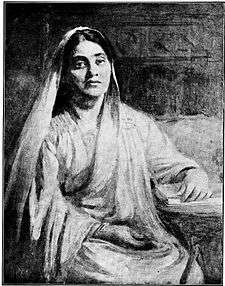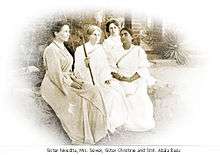Abala Bose
Abala, Lady Bose (8 August 1865 – 25 April 1951) was an Indian social worker. She was known for her efforts in women's education and her contribution towards helping widows.[1]
Abala Bose | |
|---|---|
 | |
| Born | 8 August 1865 Barisal, Bengal Presidency, British India (now in Bangladesh) |
| Died | 25 April 1951 (aged 87) |
| Occupation | Social worker |
| Spouse(s) | Sir Jagadish Chandra Bose |
Early life
Bose was the daughter of Brahmo reformer Durga Mohan Das, sister of Satish Ranjan Das and Sarala Roy, and cousin of Chittaranjan Das and Chief Justice of India Sudhi Ranjan Das. She was born in Barisal on 8 April 1864. She belonged to the Das family of Telirbagh, Dhaka, now in Bangladesh. She married scientist Sir Jagadish Chandra Bose in 1887.[1]
She was among the early students of Banga Mahila Vidyalaya and the Bethune School (established by Bethune), gaining entrance with a scholarship in 1881. As a woman, she could not secure admission to Calcutta Medical College. She went instead to Madras (now Chennai) in 1882 on a Bengal government scholarship to study medicine. She appeared in the final examination, but had to return because of ill health before the result was declared. She passed the examination but never learned of her success.[1]
Career
Apart from working as an educator, Bose was an early feminist. Writing in English magazine Modern Review, she argued that women should get a better education, "not because we may make better matches for our girls ... not even that the services of the daughter-in-law may be more valuable in the home of her adoption, but because a woman like a man is first of all a mind, and only in the second place physical and a body."[2] Kamini Roy, who studied with her in Bethune School, picked up feminism from her. Upon her husband's knighthood in 1916, she became Lady Bose.

. Bose served as Secretary of Brahmo Balika Shikshalaya from 1910 to 1936. She died on 26 April 1951.[1]
References
- Sengupta, Subodh Chandra and Bose, Anjali (editors), 1976/1998, Sansad Bangali Charitabhidhan (Biographical dictionary) Vol I, (in Bengali), p23, ISBN 81-85626-65-0
- Ray, Bharati (1990). "Women in Calcutta: the Years of Change". In Chaudhuri, Sukanta (ed.). Calcutta: The Living City. Volume II: The Present and Future. Oxford University Press. p. 36. ISBN 978-0-19-563697-0.